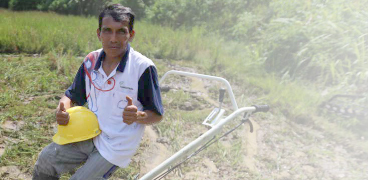
Through APP’s Desa Makmur Peduli Api program or also known as Integrated Forestry and Farming System (IFFS), we seek prosperity for communities while working to reduce illegal logging, forest fires, and conflicts. Every story from each community member in this program shows how human well-being and environmental conservation can go hand in hand–and how we can all work together for a better future. And this is the story of how Lidat becomes a successful farmer by protecting the forest.
Meet Lidat, a 49-year-old farmer from Mengkiang, a village in Sanggau Regency, West Kalimantan, Indonesia. The area, which is now home to a population of over 400,000, had been the territory of Sanggau Kingdom in the 4th century AD. However, this particular village has recently written its own story.
Just like most of his fellow villagers, Lidat cultivates rice to make a living and as his daily meal. Some villagers also depend on farming natural rubber, fish, and poultry. Nature has always been the primary source of income for the people of Mengkiang, and the village has plenty of it. But that does not necessarily mean that there are never problems.
“We have always depended on the forest to make a living. It was like a ‘supermarket’ for us because we could obtain all of our everyday needs in the woods,” said Lidat. “Yet due to the lack of accessibility and information, we only have limited knowledge to manage our lands. We’ve always followed the old way taught by our ancestors.”
And that 4th-century way of doing things certainly does not fit today’s standards. It is basically what we now call the slash-and-burn method. In his own words: “I used to farm corn and rubber. Back then, I would move from place to place, burning lands every year to clear areas for farming.”
But those days are over as Lidat and others joined the DMPA program in 2015. The program aims to improve livelihoods, transfer knowledge, improve collaboration, and create a virtuous circle of forest management. Thanks to the program, Lidat has not only become a successful farmer, but he is also able to contribute to the protection of the forests.
Through the DMPA program, he learned that the old method of clearing land is not only harmful but also expensive. Protecting the environment, on the other hand, could instead be beneficial for him and his fellow villagers. The farmers in the village received substantial support from the program, including hand-tractors, fertilizers, pesticides, and herbicides. The assistance was to encourage the villagers to take part in responsible and sustainable forest management actively.
“I used to harvest 60 sacks (about 4.5 tonnes) of rice before. Now, I can have around 105 sacks (about 7.8 tonnes),” explained Lidat, who is also now the head of Mutia Agung Farmers Group, sharing his accomplishment. “Back in the days, when we were using hand hoes, the cost of labor could easily reach over Rp2 million (around US$131). Since 2016, we’ve started using hand-tractors, and we only spend about Rp400 thousand (around US$26) per hectare.”
It never occurred to him before that protecting the environment could bring positive impacts to his family and fellow villagers. But in the end, the DMPA program not only helped environmental conservation but also, for the farmers, reduced the cost of land preparation and increased the sum of farm production. Lidat certainly hopes more and more people will join the program and leave behind the irresponsible land clearing methods.
It is our commitment to protect the environment and improve the lives of our community. And, we hope that, like Lidat and the villagers of Desa Mengkiang, we can all work and grow together today for a better tomorrow. Learn more about the DMPA program here.